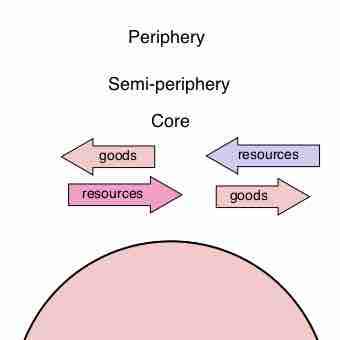Thinking Globally
Historically, sociologists have tended to focus their work on individual countries, studying the social processes and structures within a single country. Some current scholars criticize that approach as "methodological nationalism" because it fails to consider the global connections and patterns that shape local and national situations. In addition, sociology has traditionally focused on Western societies, but has recently expanded its focus to non-Western societies. These shifts illustrate the fact that it is no longer possible to study social life without thinking globally. Contemporary societies have become so porous and interconnected (a process that scholars have termed globalization) that to ignore the global patterns would be to present an incomplete picture of any social situation .

Globalization
Global processes touch all corners of the world, including this mall in Jakarta, Indonesia, where the fast-food business model originating in the United States is now a part of everyday life.
World Systems Theory
Thinking globally in sociology could entail a variety of different approaches. Some scholars use world systems theory. World systems theory stresses that the world system (not nation states) should be the basic unit of social analysis. The world-system refers to the international division of labor, which divides the world into core countries, semi-periphery countries, and the periphery countries. Core countries focus on higher-skill, capital-intensive production, and the rest of the world focuses on low-skill, labor-intensive production, and the extraction of raw materials. This constantly reinforces the dominance of the core countries. Nonetheless, the system is dynamic, and individual states can gain or lose their core (semi-periphery, periphery) status over time. For a time, some countries become the world hegemon; throughout the last few centuries, this status has passed from the Netherlands to the United Kingdom and, most recently, to the United States.
The most well-known version of the world system approach has been developed by Immanuel Wallerstein in 1970s and 1980s. Wallerstein traces the rise of the world system from the 15th century, when the European feudal economy suffered a crisis and was transformed into a capitalist one. Europe (the West) utilized its advantages and gained control over most of the world economy, presiding over the development and spread of industrialization and the capitalist economy, indirectly resulting in unequal development.
Other approaches that fall under world systems theory include dependency theory and neocolonialism. Dependency theory takes the idea of the international division of labor and states that peripheral countries are not poor because they have not adequately developed, but rather are poor because of the very nature of their relationship with core countries. This relationship is exploitative, as the resources needed by peripheral countries to develop are funneled to core countries. Poor countries are thus in a continual state of dependency to rich countries .

Dependency Theory
According to dependency theory, unequal exchange results in the unequal status of countries. Core countries accumulate wealth by gathering resources from and selling goods back to the periphery and semi-periphery.
Neocolonialism (also known as neoimperialism) also argues that poor countries are poor not because of any inherent inadequacy. Neocolonialism emphasizes the unequal relationships between former colonizing countries and colonized regions. Domination (not just economic, but also cultural and linguistic) still continues to occur even though poor countries are no longer colonies.
Global Institutions
The top-down approach is not only used to study the global economy, but also social norms. Sociologists who are interested in global social norms focus their attention on global institutions, such as the United Nations, the World Health Organization, the International Monetary Fund, or various other international organizations, such as human rights groups.
John Meyer, a Stanford sociologist, is one of these. Meyer coined the term "world society" (or "world polity") to describe scripts, models, and norms for behavior that originate from global institutions and that transcend the nation state. These norms form a global civil society that operates independently of individual nations and to which individual nations often strive to conform in order to be recognized by the international community.
Globalization from Below
Another approach to studying globalization sociologically is to examine on-the-ground processes. Some sociologists study grassroots social movements, such as non-governmental organizations which mobilize on behalf of equality, justice, and human rights. Others study global patterns of consumption, migration, and travel. Still others study local responses to globalization.
Two ideas that have emerged from these studies are glocalization and hybridization. Glocalization was a term coined by a Japanese businessman in the 1980s and is a popular phrase in the transnational business world. It refers to the ability to make a global product fit a local market. Hybridization is a similar idea, emerging from the field of biology, which refers to the way that various sociocultural forms can mix and create a third form which draws from its sources, but is something entirely new.
The possibilities for thinking globally in sociology are as varied as the world we live in: global finance, global technology, global cities, global medicine, global food. The list is endless. If we examine any social situation closely, the global patterns and linkages behind it will undoubtedly emerge.